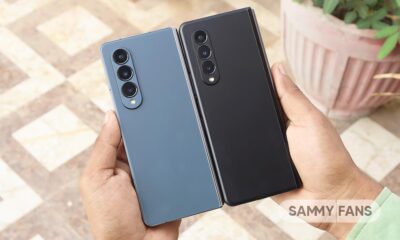News
Yep, Samsung One UI 6 might be based on Android Upside Down Cake (14)

Samsung is currently distributing the Android 12-based One UI 4.1 software upgrade to eligible Galaxy devices. Moving ahead, the company is reportedly planning to initiate the Android 13-based One UI 5 Beta program by July this year.
Meanwhile, seems like, Google has already revealed the internal codename of the Android 14 operating system. According to information dug by 9to5Google, the US tech giant has internally given a dessert name (codename) to the Android 14 mobile platform, which is “Upside Down Cake”.
Join SammyFans on Telegram
In an alphabetical manner, Google gives a dessert name to every new Android version, for example, we call Tiramisu to Android 13. Accordingly, it was already anticipated that the next OS will have a dessert name starting with the alphabet “U”, which is now exposed too ahead.
Samsung’s own created One UI is also based on Google’s Android operating system. While the current One UI 4 is based on Android Snow Cone, the upcoming One UI 5 will surely be based on the Android Tiramisu. Hence, we can assume that the forthcoming Samsung One UI 6 (tentative name) will be on top of Android 14 – Upside Down Cake.
Image: Samsung One UI 6 | Upside Down Cake
Upside Down Cake
According to the info, we can refer to an upside-down cake as a cake, which is baked “upside-down” in a single pan along with its toppings at the bottom of the pan. After baking the cake once, the same procedure has been followed, just by ultimately flipping the cake. Read more at Wikipedia
News
Forbes: Samsung’s Jay Y. Lee is the richest Korean in 2024

Samsung’s executive chairman Jay Y. Lee (Lee Jae-yong in Korean) topped the Forbes 2024 Richest Korean list for the first time. On April 17, Forbes revealed that the Samsung boss is the richest in South Korea, with his assets increasing by $3.5 billion, bringing his total net worth to $11.5 billion.
Thanks to a rise in Samsung’s stocks, Samsung’s Lee jumped to the top of the Forbes 2024 Richest Korean list. Notably, the company’s stocks significantly hiked after the revelation that it’s developing high-bandwidth memory chips used in AI computing for NVIDIA.
Forbes 2023 Richest Korean, Kim Byung-ju, slipped to second this year with assets worth $9.7 billion. The third place went to Seo Jung-jin, honorary chairman of Celltrion, with assets of $7.5 billion.
Cho Jung-ho, chairman of Meritz Financial Group, ranked fourth with $6.2 billion, and Chung Mong-koo, honorary chairman of Hyundai Motor Group, was fifth with $4.6 billion.

Stay up-to-date on Samsung Galaxy, One UI & Tech Stuffs by following Sammy Fans on X/Twitter. You can also discover the latest news, polls, reviews, and new features for Samsung & Google Apps, Galaxy Phones, and the One UI/Android operating system.
Do you like this post? Kindly, let us know on X/Twitter: we love hearing your feedback! If you prefer using other social platforms besides X, follow/join us on Google News, Facebook, and Telegram.
News
Samsung builds AI-focussed Advanced Processor Lab in the US
Samsung established an AI chip design-dedicated Advanced Processor Lab in Silicon Valley, US. Formerly known as the Advanced Institute of Technology, Samsung’s SAIT is said to have formed the new Lab to strengthen its AI chip R&D in the US.
BusinessKorea reports that the new Samsung Advanced Processor Lab to focus on developing next-gen AI semiconductor design assets in the US. The assets are said to be focused on the RISC-V area, which serves as a foundational design asset for semiconductor chip design.
Samsung’s initiative with RISC-V is interpreted as a move towards technological independence. Therefore, the company is expanding its R&D organization in Silicon Valley, aiming to enhance design capabilities to disrupt the market currently dominated by NVIDIA.
Amid the booming AI era, the market of advanced semiconductors is also expanding. Samsung has completed the development of its Mach-1 AI semiconductor and supplied prototypes to global firms including Korea’s Naver. The company has also started the development of Mach-2.
Under the CHIPS Act, Samsung received huge subsidies to boost investment in the US. It’s worth noting that the Biden govt awarded a 12% subsidy of Samsung’s total investment, which is significantly higher than Intel and TSMC’s subsidy.
Stay up-to-date on Samsung Galaxy, One UI & Tech Stuffs by following Sammy Fans on X/Twitter. You can also discover the latest news, polls, reviews, and new features for Samsung & Google Apps, Galaxy Phones, and the One UI/Android operating system.
Do you like this post? Kindly, let us know on X/Twitter: we love hearing your feedback! If you prefer using other social platforms besides X, follow/join us on Google News, Facebook, and Telegram.
News
Samsung Galaxy S25’s 3nm Exynos 2500 to beat Snapdragon 8 Gen 4 in power efficiency

Samsung’s first 3nm Exynos 2500 chip could outpace Snapdragon 8 Gen 4 in power efficiency. Both chipsets will power the next-gen Galaxy flagships, scheduled for an early 2025 launch. Recent input suggests that Exynos is returning as a tough rival to Snapdragon.
The Exynos 2500 will be made on Samsung’s 2nd-gen 3nm process technology. The S24’s Exynos 2400 chipset impressed the industry with significant improvements over its predecessor. The company appears to be leveling up the game next year.
Thanks to the cutting-edge process node, Samsung’s next Exynos could finally surpass its Snapdragon counterpart in power efficiency. The company may utilize its advanced FOWLP in the Exynos 2500 to make it run at higher clock speeds at the same power consumption level.
Qualcomm is facing power efficiency concerns with its recent Snapdragon chips. Due to reduced efficiency, phone makers are forced to bring up to 5000mAh battery. Samsung apparently seized this opportunity to bring back its in-house Exynos back to the contest.
Stay up-to-date on Samsung Galaxy, One UI & Tech Stuffs by following Sammy Fans on X/Twitter. You can also discover the latest news, polls, reviews, and new features for Samsung & Google Apps, Galaxy Phones, and the One UI/Android operating system.
Do you like this post? Kindly, let us know on X/Twitter: we love hearing your feedback! If you prefer using other social platforms besides X, follow/join us on Google News, Facebook, and Telegram.











